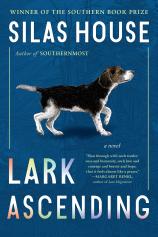Lark Ascending
Review
Lark Ascending
It sounds heartless, but there is something that fascinates us about tales of disasters and their aftermath, particularly when they’re rooted in human carelessness, cruelty or hubris. Think of the Titanic, or a devastating hurricane or tidal wave, or an authoritarian takeover, or a planetary meltdown. Readers wonder how they would cope --- whether they would find a lifeboat, so to speak, and survive. And now, in the wake of the pandemic, an apocalypse no longer seems the stuff of scary movies or dark fantasy novels. It’s a clear and present danger.
LARK ASCENDING by the Kentucky-based novelist Silas House belongs to this tradition. However, its most powerful quality is not the bleakness and desperation of a broken society, but the rediscovery of nature as a wondrous thing that you live with rather than attempt to conquer. The book takes its title from “The Lark Ascending,” an 1881 poem by George Meredith in praise of birdsong and “love of Earth,” which later inspired an iconic violin solo by Ralph Vaughan Williams. House’s fine, lyrical writing is tuned to music and poetry (references to Yeats and Heaney; fiddle music, folk songs, mournful ballads), even as it celebrates the glories of the natural world. It’s a pleasure to read.
"I hope [LARK ASCENDING is] widely read. In this benighted, environmentally threatened world, where there’s too much stuff and too little care for people, we need novels like these, to warn and inspire."
The novel is cast in elegiac mode: Lark, at 90, making a record of his life. He recalls only child’s-eye snippets of the time before worldwide collapse (fire, followed by famine, followed by a takeover by fanatics known as Fundamentalists, or Fundies, and the ensuing Slaughters). Moving from Maryland to rural Maine --- his parents, a doctor and a professor of horticulture, are savvy about wilderness survival --- he grows up in a secluded utopia. “We lived like the olden times,” Lark remembers: hunting, gathering, fishing, gardening. His only companions are Sera and Arlo, the two children of his mother’s friend Phoebe, who migrates with them. The three kids become like siblings --- and then more than siblings, as a teenaged Lark and Arlo fall in love.
Life in Maine is blissful but dangerous, as the Fundies punish same-sex lovers with death (the same goes for priests, professors, feminists, artists: anyone different, anyone who resists). As fire and war draw closer, this little community must strike out for a new and safer place. Ireland is still said to be accepting refugees, and so they set out for Canada --- 600 miles on foot --- to find a boat. Lark’s mother once visited a former monastic settlement in Ireland called Glendalough, reputed to be “a place protected by positive energy, where the veins of good that ran throughout the earth intersected.” That mystical site becomes their ultimate goal.
Lark is the only one to survive the journey; the others are shot, stabbed, drowned. “Somehow I was saved,” he writes. “I was the last one of my people.” Phrases like these could have come straight out of MOBY DICK (“Call me Ishmael”) --- definitely a 19th-century vibe --- and, as in that book, suggestions of larger allegorical meaning are grounded by keenly observed everyday details.
Having learned in Maine to live in the backwoods, Lark can build a fire and feed himself on native plants or sea snails; he is trained “to move through the world with heightened hearing, seeing, smelling, feeling.” This allows him to evade capture or killing by soldiers --- Ireland is in the same wretched state as America, burned out and depopulated, riven by a war between anti-immigrant extremists, the Nays, and the resistance --- and also to sense the presence of other creatures in the underbrush.
One day it’s foxes he runs into; the next it’s a beagle --- a sort of miracle, as dogs have long been outlawed in both the U.S. and Ireland because of the sheer lack of food. This fellow, Seamus by name, takes over the narration (his voice is different from Lark’s: simpler sentences, very Irish, less literary), which is a marvel and a delight and also a way to fill us in on the bitter recent history of the country. Seamus’ owner, who trained him not to bark so as to conceal his (illegal) presence, ultimately died of starvation. Since then, the dog, like Lark, has been alone. They seem to sense each other’s sorrow.
Then, a second miracle: meeting Helen, a tough fiftyish resistance fighter whose husband and son have vanished. These three lost and orphaned souls form a family of sorts. They head toward Glendalough, encountering horrors (an entire family executed by hanging; refugee camps), traitors (a scary father and daughter), fierce storms, unexpected nourishment (a can of sardines; a cow). Trust builds between them; they share their most intimate secrets.
All this is wrapped in a gorgeous sense of language. Helen, who turns out to have been a teacher of Irish, uses some lovely words: gloaming for twilight; murmuration for a blizzard of starlings. On the fatal Atlantic crossing, Lark writes, “I’d open my eyes and look out at the aching blue of the ocean…a gray blue like a storm full of unspent lightning and unfallen rain. There was some comfort in knowing that, although the world was being torn in two, there were still remarkable things…that refused to lose their shine.” At the end of day, “dusk began to spread its quilts out over the land…. shadows fall and stillness yawns and stretches its shoulders.”
I very much liked Lark’s voice, with its unusual cadence, kind of Southern crossed with Irish; its avoidance of contractions; its old-fashioned vocabulary ("the whole particulars"; recall rather than remember). Spare and slightly formal, it seems untouched by the modern world. It is also, in my opinion, a bit too ready to philosophize. I’m sure House meant these musings on death, grief and belief to suggest an old man’s retrospective pondering; sometimes, though, Lark’s soliloquizing happens too frequently and abruptly, stalling the narrative. I wanted to say, Just tell the story!
In the end, do Helen, Lark and Seamus reach Glendalough? No spoilers here --- but I will say that while happy-ish endings are not typical of post-apocalyptic fiction, LARK ASCENDING may surprise you. I hope it’s widely read. In this benighted, environmentally threatened world, where there’s too much stuff and too little care for people, we need novels like these, to warn and inspire.
Reviewed by Katherine B. Weissman on September 30, 2022




